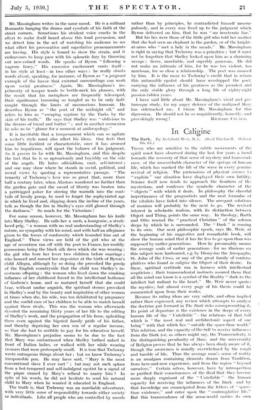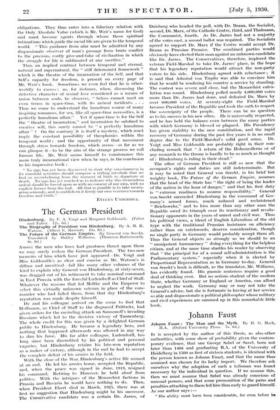In Caligine
THOSE who arc sensitive to the subtle movements of the spirit must have observed during the last few years a trend towards the recovery of that sense of mystery and t ranscend- ence, of the unsearchable character of the springs of human life, which has marked the lift of the wave in every genuine revival of religion. The pretensions of physical science to " explain " our situation have displayed their own futility. Science itself now tends to approach the frontiers of the mysterious, and confesses the symbolic character of the " objects " with which it deals. In philosophy the cheerful impertinences of the pragmatists and the neat formulae of the vitalists have faded into silence. The arrogant solutions of monism will probably be the next to go. The revived interest in scholastic realism, with its distinctions between Object and Thing, points the same way. In theology, Barth and Otto remind the " practical Christian " of the solemn deeps by which he is surrounded. The " Dark " is coining to its own. Our next philosophic epoch, says Mr. Weir, at the beginning of his suggestive and remarkable book, will Show the human mind that it has far less to go upon than was supposed by earlier generations. Here he presumably means the average souls of earlier generations—for no illusions on this subject were harboured, e.g. by Dionysius the Areopagitc, St. John of the Cross, or any of the great family of contemn- platives who found in caligine the Object of their desire. In these, spiritual certitude ran in harness with intellectual scepticism ; their transcendental instincts assured them that all the mind can know is a symbol of the Reality " dark to the intellect but radiant to the heart." Mr. Weir never quote; the mystics; but almost every page of his thesis could be commented upon from their works.
Because its ruling ideas arc very subtle, and often implied rather than expressed, any review which attempts to analyse the doctrine put forward in The Dark risks misrepresenting it. Its point of departure is the existence in the deeps of every human life of the " Untenable "—the relations of that Self which is " the most real and architectonic aspect of our being " with that which lies " outside the space-time world." This relation, and the capacity of the Self to receive influence3 from the Dark (or, as others might say, the Transcendent), is the distinguishing peculiarity of Man; and the universality of Religion proves that he has always been dimly aware of it, though the awareness is usually overwhelmed by the rough and tumble of life. Thus the average man's sense of reality is an amalgam containing elements drawn from Tradition, from here-and-now experience, and from the region " beyond ourselves." Certain selves, however, have by introspection so purified their consciousness of the Real that they become more deeply cognisant of the " Untenable "—the human capacity for receiving the influences of the Dark—and by that knowledge are emancipated from the fetters of " space- time existence," and enter upon the " contemplative life." But this transcendence of the sense-world carries its own
obligations. They thus enter into a fiduciary relation with the Only Absolute Value (which is Mr. Weir's name for God) and must become agents through whom those spiritual intimations which guide the racial life are given to the temporal world. " This guidance from afar must be admitted by any dispassionate observer of man's passage from brute conflict to the precious, costly give-and-take of civilization in which the struggle for life is sublimated at any sacrifice."
Thus an implied contrast between temporal and eternal, natural and supernatural, the " stiff determinist framework " which is the theatre of the incarnation of the Self, and that Self's capacity for freedom, is present on every page of Mr. 1Veir's book. Sometimes we even feel that he is other- worldly to excess ; as, for instance, when, discussing the defective character of sexual love considered as a means of union between souls, he observes, " Selves cannot meet on even terms in space-time, with its animal incidents. . . . Thus we come to understand the humdrum course of many inspiring romances, for sex, like all space-time necessities, is a perfectly humdrum affair." Yet if space-time is for the Self the " theatre of incarnation," and incarnation be subdued to creative will, this surely cannot be " a perfectly humdrum affair " ? On the contrary: it is itself a mystery, which must imply the constant possibility of theophanics within the temporal world ; and the opportunity of that movement through stress towards freedom, which seems—so far as we can glimpse it—to be the aim of the strange process we call human life. Mr. Weir seems himself to countenance this more truly incarnational view when he says, in the conclusion to his impressive book : " No sign has yet been discovered to show why consciousness in its manifold activities should comprise a trifling interlude that we find so overwhelming from the moment of birth to departure at death. No sign has yet reached us to indicate why this tremendous ordeal should be forced upon us with no consent of our own, with no explicit licence from the real. All that is possible is to take incarn- ation seriously, and to stablish on it firmly our own ventures towards freedom and truth."
EVELYN UNDEmIII LL.











































 Previous page
Previous page